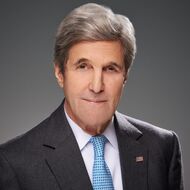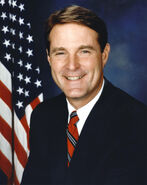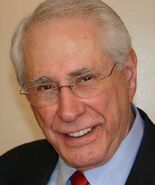The 2012 Democratic presidential primaries and caucuses were the process by which voters of the Democratic Party chose its nominee for President of the United States in the 2012 U.S. presidential election. Congressman Bernie Sanders won the Democratic Party nomination by securing more than the required 2,383 delegates on April 3, 2012 after a series of primary elections and caucuses. He was formally nominated by the 2012 Democratic National Convention on September 5, 2012, in Charlotte, North Carolina.
Candidates[]
Those who withdrew before the primaries[]
Tim Kaine, 70th Governor of Virginia
Evan Bayh, Senator from Indiana
Tom Daschle, Senate Majority Leader from South Dakota
Mark Warner, Senator from Virginia
Russ Feingold, Senator from Wisconsin
Rahm Emanuel, Mayor of Chicago
Those who withdrew during the early primaries[]
Howard Dean, 79th Governor of Vermont
Tom Vilsack, 40th Governor of Iowa
Mike Gravel, Former Senator from Alaska
"Final Five"[]
Bernie Sanders, Member of the U.S. House of Representatives from Vermont's at large district
John Kerry, Former Secretary of State
Al Gore, Former Secretary of Energy
Barack Obama, Senator from Illinois
Hillary Rodham, Senator from Texas
Declined to run[]
Joe Biden-DNC Chairman
Carol Moseley Braun-Former Vice President
Wesley Clark-Former Secretary of Defense
Andrew Cuomo-Governor of New York
Dick Gephardt-Former Attorney General
Mazie Hirono-Former Governor of Hawaii
Jesse Jackson-Former Vice President
Dennis Kucinich-Congressman from Ohio
Martin O'Malley-Governor of Maryland
Nancy Pelosi-Former Speaker of the House
Background[]
After Carol Moseley Braun's loss in the previous election, many felt the Democratic Party lacked a clear leader. Divisions remained in the party following the 2008 primaries, which pitted Braun against Al Gore.
This divide was seen as between the fiscal/military wing of the party and the environmentalist/socialist wing of the party.
Primary Race Overview []
The field grew to twelve candidates, the most for a primary since 1972. Al Gore put his name into consideration again but the party loyalists would never accept him. Howard Dean and John Kerry were seen as the early frontrunners but after a stumble in the debates Dean fell off. Bernie Sanders, who began the race polling at 2-3% ran an insurgent campaign, speaking out against moderates for serving corporate interests. His polling numbers grew and grew.
Debates[]
First Debates:[]
The first round of debates were held on July 2nd and 3rd, 2011 at the Yale School of Management in New Haven, Connecticut. They were hosted by PBS NewsHour. The debates were done in a roundtable style format. To select the lineup for the debate, PBS took the top top ten candidates and divided them into five tiers with two candidates in each tier corresponding to poll numbers. One candidate from each tier was at one of the two debates. Mike Gravel, who was polling at eleventh and last place, protested his exclusion from the debate. Supporters of him protested outside of Yale. DNC Chairman Joe Biden responded, "Mike is being ridiculous. To we need to let in anyone who says they're running is just a bunch of malarkey."
In the first primary debate on July 2nd, 2011, six candidates faced off, Tim Kaine, Barack Obama, Howard Dean, Tom Vilsack, Russ Feingold and Evan Bayh. One of the highlights of the night came when Dean stated, "The Democrats have forsaken those in the south who don't know what's best for them and those who wave the confederate flag." Governor Tim Kaine responded, "I'm sorry governor, but what I just heard sounded like you stereotyped the south as being dumb racists. Governor if you look to my home state of Virginia you will find some of the purest and most well-educated Democrats there are. Shame on you for describing the south this way and I would like you to apologize right now." To make matters worse for Dean Senator Obama interjected by saying, "Governor by mentioning the confederate flag, you evoke memories in many elder black american's minds of a time when seeing that flag flown was everyday business. By saying we need to work with these people you are appealing to racists and bigots and that can't be tolerated in the Democratic party." 12.2 million watched this debate on TV.

Obama respond to Dean's comments on southerners.- July 2nd, 2011
The second night of debates were held on July 3rd, 2011. Five candidates faced off, Tom Daschle, Bernie Sanders, John Kerry, Al Gore, Rahm Emanuel and Mark Warner. The winners of the night according to most publications were Bernie Sanders and Al Gore. These two mainly ganged up on Kerry, attacking him for some of his moderate beliefs, especially in regards to Iraq and Libya. Bernie Sanders said, "Senator Kerry, your support for the troops in the middle east shows there are no major differences between you and George Bush on foreign policy. Senator, George Bush's foreign policy is imperialistic and disastrous and has been a disaster at home and abroad. We cannot continue this foreign policy if we want the United States to be respected in the world." Al Gore also had a good night and fended off attacks from Kerry about his 2008 campaign. 14.3 million watched this debate on TV.
| 1st Night Poll | Percentage |
|---|---|
| Obama | 40.3% |
| Kaine | 27.9% |
| Vilsack | 11.8% |
| Feingold | 10.8% |
| Bayh | 7.2% |
| Dean | 2.0% |
| 2nd Night Poll | Percentage | ||
|---|---|---|---|
| Sanders | 24.9% | ||
| Gore | 22.4% | ||
| Kerry | 22.2% | ||
| Emanuel | 15.2% | ||
| Daschle | 10.1% | ||
| Warner | 5.2% | ||
Second Debates:[]
The second round of democratic debates were held on August 10 and 11, 2011. They were held by CNN at the Jimmy Carter Presidential Library in Atlanta, Georgia. The top six candidates were chosen for the first debate and the bottom seven were chosen for the second undercard debate.
The first night saw the top six candidates face off, Bernie Sanders, Barack Obama, Al Gore, John Kerry, Howard Dean and Rahm Emanuel. Evan Bayh's failure to make the frontrunner debate was seen as a big blow to his campaign. One of the main topics of the night was Osama Bin Laden's near-escape. These events put anti-death penalty democrats in a tough position. When asked about this, Bernie Sanders said, "Let me ask you this. Would this prison break have gotten as far as it did without George Bush? Think about it, George Bush cuts the taxes on the rich and powerful, takes funding out of government programs- healthcare, social security and most importantly in this importance, prisons! If these prisons weren't so underfunded then would this brutal murderer have been allowed to conduct this escape? The answer is no! This is absolutely George Bush's fault not Bill Bradley's." George Bush responded to this attack after the debate by saying, "Bernie doesn't understand the effectivinity of the death penalty." John Kerry was deemed as a winner of the night with his stand out line, "If we turn to radicals, America will see them for what they are, radicals." 8.4 million watched this on TV.
The second night saw the bottom seven candidates face off. Mike Gravel, Mark Warner, Tim Kaine, Evan Bayh, Russ Feingold, Tom Vilsack and Tom Dashcle Gravel was seen as a chaos candidate, attacking everyone on stage. One of the most shared moment on MySpace after the debate was when Gravel refused to stop talking and Bayh said, "Would you just shut up. (Laughs) I mean why are we giving this guy any air? He thinks that the Kenyan bombing was a false flag." 4.3 million watched this on TV.
Third Debate:[]
The third presidential debate was held on August 25, 2011. The top ten candidates were chosen for a debate on one night.
Primary Results[]
|
Sanders |
Kerry |
Gore |
Obama | Rodham | Dean | Vilsack | Gravel | ||
|---|---|---|---|---|---|---|---|---|---|
| January 3, 2012 | Iowa | 21.1% | 20.2% | 18.0% | 17.1% | 16.8% | 2.8% | 3.7% | .3% |
| January 10, 2012 | New Hampshire | 20.7% | 22.3% | 19.3% | 13.2% | 17.8% | 5.6% | 1.1% | |
| January 21, 2012 | Nevada | 13.4% | 25.9% | 14.6% | 18.7% | 24.3% | 3.1% | ||
| January 28, 2012 | South Carolina | 1.4% |
















